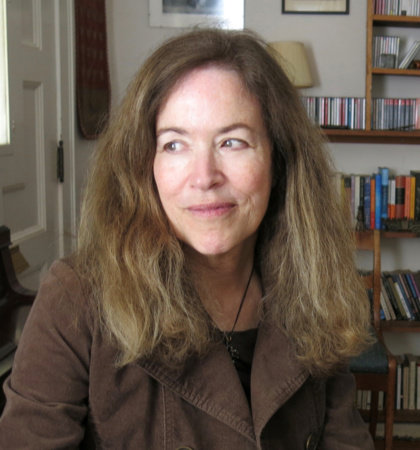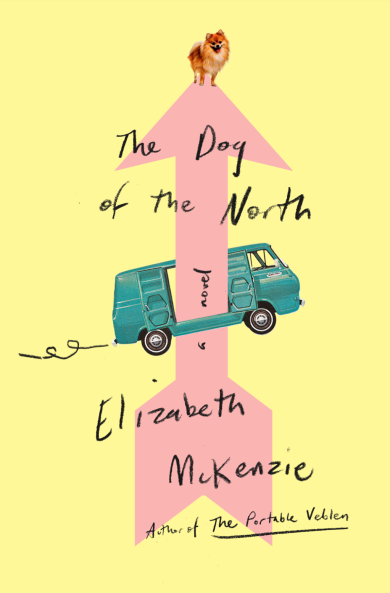Alumna Profile: Elizabeth McKenzie

Elizabeth McKenzie (BA, Literature, 1981) is a nationally acclaimed writer and editor who is also a pivotal figure in Santa Cruz’s local writing scene. McKenzie is the author of the novel The Portable Veblen, which was longlisted for the National Book Award and shortlisted for the Baileys Women’s Prize; a collection, Stop That Girl, shortlisted for The Story Prize; and the novel MacGregor Tells the World, a Chicago Tribune, San Francisco Chronicle, Library Journal Best Book of the Year. Her work has appeared in The New Yorker, The Atlantic, The Best American Nonrequired Reading, and was recorded for NPR’s Selected Shorts. She is the senior editor of the Chicago Quarterly Review and the managing editor of Santa Cruz based national literary magazine Catamaran. On March 14th, McKenzie will be in conversation with Karen Joy Fowler about her highly-anticipated new novel, The Dog of the North, at Bookshop Santa Cruz at 7:00pm. Recently, we learned more about McKenzie’s new book, The Dog of the North; her writing practice; Santa Cruz’s vibrant writing community; and the special connections between The Humanities Institute, UCSC literary programs, and Bookshop Santa Cruz.
Hi Elizabeth! Thanks for chatting with us and congratulations on your upcoming book, The Dog of the North! To begin, could you give us a little teaser/synopsis of The Dog of the North? What would you like your readers to know about the story, going in?

My son tells me it’s about expatriation, colonialism and western expansionism, but I usually say it’s about a woman moving on after a failed marriage who stumbles into a series of misadventures, partly caused by her own propensity for misunderstanding people. It starts in Santa Cruz but eventually ends up in Santa Barbara, Australia, and Texas.
What was your writing process like for this project? Did this project involve any research or travel? Was there something you discovered along the way that surprised you?
Yes, surprises happened right and left. I didn’t plan the story or have an outline. Only a sense of the mood I wanted to land on at the end. Once it was finished I travelled to Australia to revisit some of the locations I’d been to years before, including driving part of the route that Penny takes into the Outback. Also really got into geology, writing about the karst formations in Queensland, and biological control agents, such as the cactoblastis moth used to curtail the great prickly pear invasion of the state.
On March 14th, you’ll be in conversation at Bookshop Santa Cruz with another beloved local writer, Karen Joy Fowler. Can you tell us a little bit about the writing community in Santa Cruz? What is your role in this community and how has it shaped you as a writer?
It was the poetry scene in Santa Cruz that drew me here in the 70s—the annual Santa Cruz Poetry Festival at the Civic Auditorium (1974-1978) was a big happening. At UCSC I was taking classes with Lynn Sukenick and James B. Hall and George Hitchcock was the faculty adviser of the literary magazine I started with a few friends, The Blunt Probe. The poets of Santa Cruz continue to amaze me. I’ve been in the same writing group here since 1988, so I’m happy to be surrounded by writing comrades and new ones keep showing up.
The Humanities Institute has a longstanding collaboration with Bookshop Santa Cruz to support literary gatherings. You have participated in events at Bookshop Santa Cruz as well as the Living Writers series on campus. What is the importance of bridging higher education with independent bookstores, and specifically bringing together Santa Cruz’s academic and broader artistic communities in this way?
I don’t know where you could find a richer community of writers. Between the town and the university we’ve got it made.
That there is such an active literary life in Santa Cruz means a lot to everyone, and between the hub of Bookshop Santa Cruz and a program like the Living Writers Series pioneered by Micah Perks and Karen Yamashita, I don’t know where you could find a richer community of writers. Between the town and the university we’ve got it made.
You currently serve as the Managing Editor of Catamaran, a quarterly literary and visual arts magazine that recently celebrated its ten year anniversary. What, for you, has been the most interesting or enduring aspect of this work? What advice might you give to early-stage writers who are eager to submit their work?
Working with Catherine Segurson to achieve her vision of establishing a national literary magazine in Santa Cruz has been really rewarding. I’ve been working on publications since leaving UCSC, first at The Atlantic Monthly and then at Chicago Quarterly Review, so editorial work continues to be a major focus for me. And Catamaran has been involved with UCSC from the start, with the Hitchcock Prize and our internship program, and since Catamaran’s merger with Jory Post’s Santa Cruz Writes, which sponsors the Morton Marcus Prize. We’re very receptive to emerging writers and have been fortunate to publish a number of UCSC students, grad students, as well as faculty and alums.
Could you describe your current writing space? What objects do you keep nearby? What sounds can you hear?
I don’t think I should describe it. Let’s just say it’s stuffed with books and files and papers and that within its walls there’s barely room to move. I should probably do something about that!
Banner Image: Elizabeth McKenzie’s book covers. From left to right: My Postwar Life: New Writings from Japan and Okinawa (2012), Stop That Girl (2005), MacGregor Saves the World (2007), The Portable Veblen (2016)
